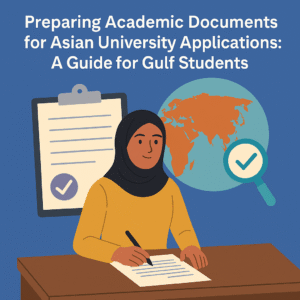
Studying in Asia is becoming an increasingly attractive path for students from the Gulf region (UAE, Saudi Arabia, Qatar, Kuwait, Bahrain, Oman). Asian universities offer world-class education, cultural diversity, and excellent career prospects, particularly in countries such as Japan, South Korea, China, Malaysia, Singapore, and India. However, applying to these universities involves carefully preparing your academic documents to meet their specific requirements.
This blog outlines what Gulf students need to know about preparing and authenticating academic documents for undergraduate and graduate programs in Asia. We cover transcripts, diplomas, translations, notarization, legalization (including apostille/attestation), and country-specific requirements.
Undergraduate vs. Graduate Application Requirements
| Requirement | Undergraduate Applicants | Graduate Applicants |
| Academic Records | High school diploma and transcripts | University degree certificate(s) and transcripts |
| Standardized Tests | May be required (e.g., SAT, national exams) | May be required (e.g., GRE, GMAT) |
| Language Proficiency | TOEFL, IELTS, or equivalent | TOEFL, IELTS, or equivalent |
| Additional Documents | Passport, recommendation letters | Passport, recommendation letters, research proposal, CV |
Preparing Academic Transcripts & Diplomas
- Obtain Official Copies: Request official transcripts from your institution. They should include an official seal and signature.
- Do Not Send Originals: Never send your only original diploma. Submit notarized or certified true copies instead.
- Understand Submission Formats: Some universities accept digital uploads; others require physical, sealed documents.
- Keep Multiple Sets: Have at least 2-3 sets of notarized/certified copies for different stages (admissions, scholarships, visa).
Certified Translations: Language Matters
| Original Document Language | Translation Required? | Accepted Translation Language | Notarization Needed? |
| Arabic | Yes | English or the host country’s language | Yes |
| English | Usually No | N/A | Only if explicitly required |
| Local Gulf Curriculum | Yes | English | Yes |
Tips:
- Use certified translators.
- Ensure the translation includes a statement of accuracy.
- Include both the original and translated versions when submitting.
Notarization & Legalization: What You Need to Know
| Term | What It Means | When It’s Needed |
| Notarization | Certified copy or translated document attested by a notary | Always required for key documents |
| Apostille | International certification for countries in the Hague Convention | When both the Gulf & Asian countries are members |
| Legalization (Attestation) | Multi-step embassy validation | For non-Hague countries like the UAE, China, and Malaysia |
Hague Convention Members (as of now):
- Gulf: Saudi Arabia, Bahrain
- Asia: Japan, South Korea, India, Singapore
Non-Members: UAE, Oman, Kuwait, Qatar, China, Malaysia
Country-Specific Requirements
| Country | Apostille Accepted? | Notarization Required? | Embassy Attestation Needed? | Language for Docs |
| Japan | Yes | Yes | No (if apostille provided) | English or Japanese |
| South Korea | Yes | Yes | No (if apostille provided) | English or Korean |
| China | No | Yes | Yes | English or Chinese |
| Malaysia | No | Yes | Yes | English or Malay |
| Singapore | Yes | Yes | No (if apostille provided) | English |
| India | Yes | Yes | No (if apostille provided) | English |
Suggested Preparation Timeline
| Timeline | Task |
| 12+ Months Before | Research universities, gather original documents |
| 9-10 Months | Start translations, confirm country-specific rules |
| 6-8 Months | Begin the notarization and legalization process |
| 4-5 Months | Prepare complete application packets |
| 2-3 Months | Final checks and backups |
| Post-Submission | Visa preparation and enrollment document checks |
Document Checklist for Gulf Students
- Official academic transcripts (notarized)
- Degree/diploma certificate (notarized)
- Certified translations (with notarized statement)
- Apostille or embassy attestation
- Proof of language proficiency
- Passport copy
- Letters of recommendation
- Statement of Purpose (SoP) or research proposal (if needed)
- Financial documents (bank statement, sponsor letter)
- Medical and police clearance (if required)
Final Thoughts
Preparing academic documents for Asian university applications is a multi-step process, but with early planning and attention to detail, it is entirely manageable. Gulf students should prioritize official transcripts, certified translations, and proper authentication (notarization + apostille/attestation) tailored to the destination country.
Following the steps in this guide will not only streamline your application process but also increase your chances of acceptance and smooth enrollment. Investing the time now in properly preparing your documents will pay off when you arrive on campus ready for success in Asia.
For personalized assistance with credential evaluations or document preparation, contact ACEI to discuss options in Gulf-to-Asia admissions pathways.
